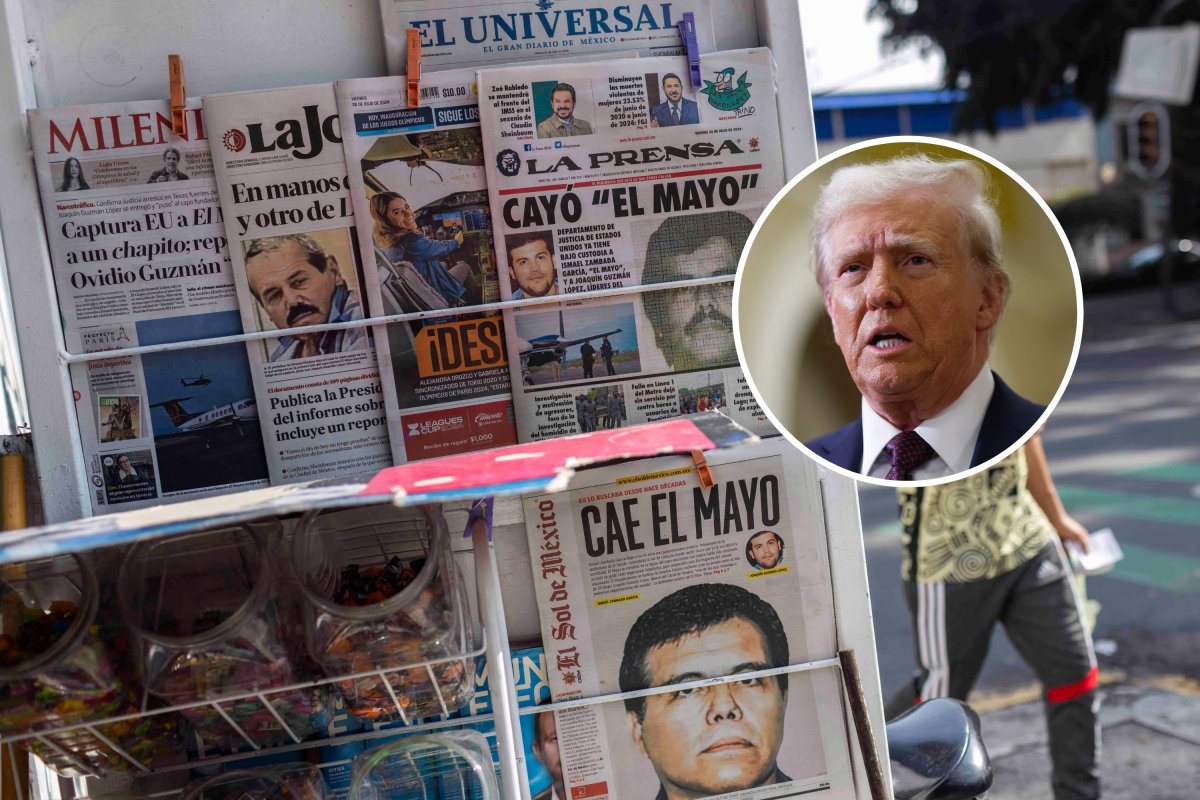The incoming Trump administration is said to be considering another attempt at designating Mexican drug cartels as terrorist organizations as part of wider immigration tactics, but some experts are warning this could backfire and drive more migration.
President-elect Donald Trump's team have been eyeing up the idea once more, CNN reported, after a failed attempt during his previous term in the White House, with the surge of fentanyl into the U.S. since that time part of the driving force.
Why It Matters
Mark Krikorian, executive director of the right-leaning Center for Immigration Studies, told Newsweek Thursday that he worries the incoming administration is making an emotional decision that will harm its objective to slow immigration by making asylum claims easier.
"It would strengthen the asylum claims of people saying they fear the cartels, or the cartels try to extort money from them or something like that," Krikorian said.
"Those are ordinary crime matters, and crime is not a grounds for asylum, but if they are terrorist organizations, it becomes a political matter and then there is a case to make that you warrant asylum because you are fleeing this political oppressor."
Newsweek reached out to the Trump-Vance transition team and the U.S. Department of State for comment via email Thursday morning.
What To Know
Mexican cartels, such as Sinaloa and Jalisco, have long been seen as powerful forces when it comes to drug trafficking and human smuggling into the United States. Many migrants traveling through Mexico rely on the criminal gangs to get them across the border, often at great expense or through exploitation.

Designating cartels as terrorist groups would make it easier for the U.S. to use military force against them. It would put the groups in the same category as the Taliban and Hamas – extremist groups that the U.S. and its allies have gone to war with.
Trump was vocal about cartels, or transnational criminal gangs, throughout the 2024 presidential election campaign. He threatened to drop bombs on fentanyl labs and send special forces to take out cartel leaders, despite this potentially being an act of aggression on allied soil.
How Are Cartels Being Tackled?
While the issue of disrupting cartel activity is seen as a bipartisan issue, Republicans have been far more vocal about taking tougher action. In 2021 and 2023, Texas Representative Chip Roy introduced legislation with the hope of achieving Trump's goal, designating four cartels as Foreign Terrorist Organizations (FTOs), but neither bill progressed.
The GOP has also said that President Joe Biden's administration had not done enough to deal with the problem, despite actions by the Department of Homeland Security to arrest key cartel members, such as Sinaloa leader "El Mayo".
A briefing from DHS in July 2024 stated that over 3,600 arrests had been made since the previous September related to the fentanyl trade, while work was underway in Mexico, with the country's permission, to stop the drug's production by cartels.

Would the Change Affect Immigration?
For Krikorian, continuing to treat cartels as transnational criminal gangs and ramping up activities like seizing assets and carrying out joint operations, would likely be a better option if Trump also wants to bring down crossings at the southwest border.
"It would make a policy like Remain in Mexico almost impossible, since the cartels have significant sway, you could even argue control, over large parts of northern Mexico near the border, where he would be returning people under a Remain in Mexico policy," Krikorian said. "The argument there would be we're sending people into a place where they would be persecuted by these political actors, so I think it would be a disaster."
Other experts have warned, however, that by designated cartels as terror groups, U.S. immigration authorities would be able to block asylum seekers f they had paid cartels money to get them across the border, as this would be seen as offering "material support" to a terrorist organization's activities.
Authorities have used discretion in this area, particularly if a migrant has been forced to hand over cash under duress.
What People Are Saying
Geoffrey S. Corn, director of the Center for Military Law and Policy at Texas Tech University School of Law, told Newsweek: "I suspect this is more for optics than legal consequences. The FTO designation is often conflated with some implied authority to treat the group as an "enemy" for war powers purposes. That is not accurate, but it is common. So this could be part of a process to lay the foundation for a presidential decision to treat the activities of the groups as sufficient to trigger what he will assert is his inherent authority to use the armed forces (and probably rely heavily on special operations forces) to attack the groups."
Krikorian, in his interview with Newsweek: "I think a lot of this is driven not just by the sense of vulnerability and permeability of our border, but obviously the cartel issue is driven by the fentanyl issue, and these are real issues, real problems, and they may well require muscular and out of the box responses."
Republican Representative Tony Gonzales told CNN: "Basically, you take the gloves off, meaning it can be anywhere from having joint operations where you're physically doing things or where you're actively targeting, maybe once again through finances, you're turning loose DOJ and FBI. Right now, some of that is happening, but it's very much in a vacuum, and there's a lot of bureaucracy and red tape attached to it before you can get to that point."
Mexican President Claudia Sheinbaum said in December: "Mexico is a free, sovereign, independent country and we do not accept interference."
Aaron Reichlin-Melick, senior fellow at the American Immigration Council, on X following Representative Roy's bill introduction in March 2023: "If the US gov designates the Sinaloa/CJNG cartels as "Foreign Terrorist Organizations," anyone who gives them any "support" (even including paying ransom to avoid being murdered) would be inadmissible and barred from asylum. Could also affect Mexican legal immigration, too."
What's Next
While Congress could introduce legislation to enact the change, the decision comes down to the Secretary of State. Trump has promised to take sweeping action on immigration as his first order of business, and he may push Marco Rubio, his pick to lead the State Department, to make the change as soon as possible.




















 English (US) ·
English (US) ·